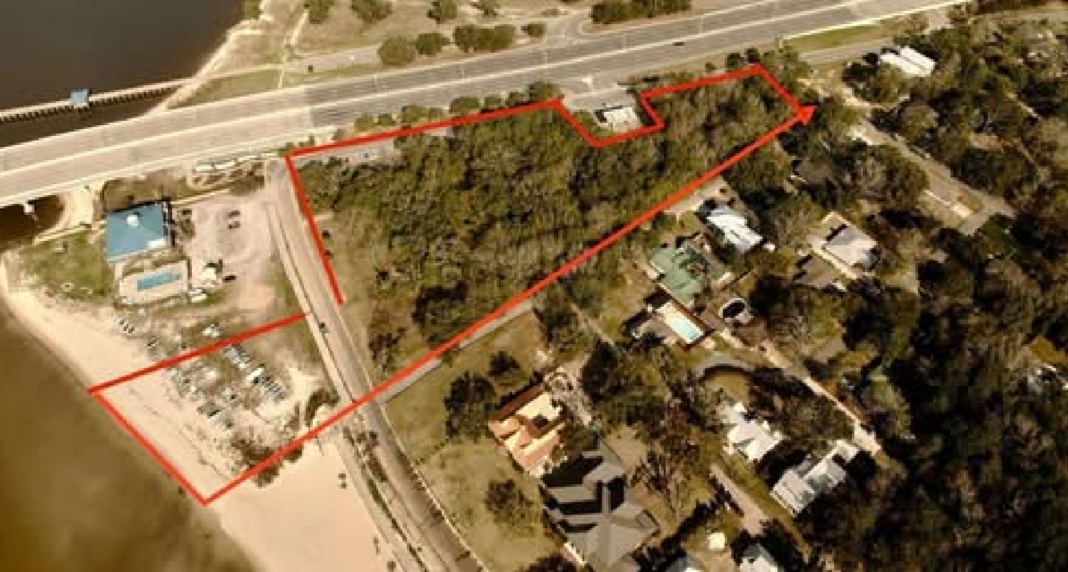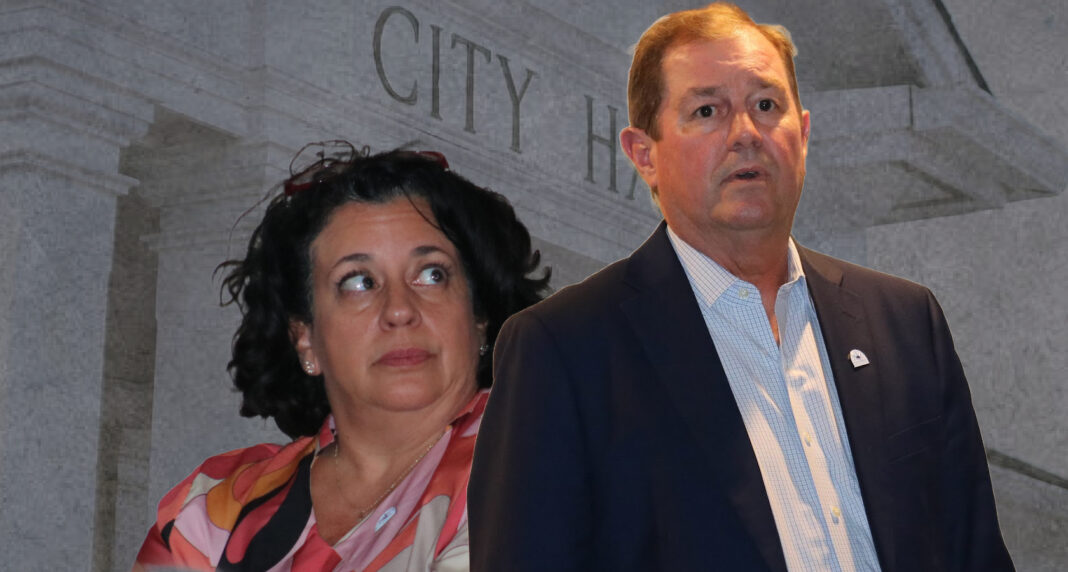Steve Bryan, a seasoned condo developer with projects in Orange Beach and Oxford, had his sights set on a prime piece of land across from the Ocean Springs Yacht Club. There was just one problem — the property wasn’t zoned for condominiums.
But Bryan had a connection. His associate, Jimmy Gouras, happened to be a longtime friend of Mayor Kenny Holloway. And in Ocean Springs, sometimes having the right connections means you don’t have to play by the same rules as everyone else.
Instead of going through the public rezoning process like any other developer, Bryan was invited to a private meeting at City Hall, where Holloway and his top officials worked together to find a workaround.
This wasn’t a public hearing, where residents and city leaders could openly discuss the project. This was a behind-the-scenes strategy session, where city officials coached the developer on how to repackage the project to avoid public scrutiny—and even tap into taxpayer funding for his private condos.
The meeting took place in May 2024. What follows is a firsthand account, drawn from the recordings of former Community Development Director Carter Thompson.
A Private Meeting with the Mayor and His Top Officials
“Carter, have a seat,” Mayor Holloway said as the meeting began. “Jimmy is an old, longtime friend of mine… Steve is a developer. He’s done a lot of condominiums, apartments, and stuff like that around Mississippi. So, he has a contract on a piece of property that’s right across the street from the Ocean Springs Yacht Club.”
For the next 40 minutes, Holloway, Thompson, and the planning department’s Carolyn Martin worked with the two gentlemen to craft a plan that would get the project shovel-ready — with as little interference from the public as possible.
They all knew the hurdle.
“We may have a rezoning issue there,” Holloway acknowledged.
For most developers, a zoning issue means filing for a rezoning request, attending public hearings, and allowing residents to weigh in. But that wasn’t the agenda here.
“We want to avoid a rezoning issue if at all possible,” Gouras stated.
“So do I! So do I!” Thompson eagerly responded.
There was no discussion on whether the zoning laws were appropriate, no debate on how this fit into the city’s long-term plan. Instead, the focus was on how to get around the rules without actually changing them.
“We don’t want to wake that up,” Gouras added, referring to the public.
Anticipating Public Resistance
The officials in the room seemed well aware the public wouldn’t support this project.
“You’ll have that segment of the population that has grown up and has always remembered it as a vacant property,” Martin said. “A lot of people feel like they have public domain over it… and now it’s somebody else’s.”
“And you’ll have the feral cat lady,” Holloway quipped.
Bryan seemed surprised by how many cats were on the property.
“It’s been a feral cat colony for over 60 years,” Martin noted.
Thompson, for her part, had no sympathy.
“I hate feral cats,” she added.
How to Get Condos Approved Without Calling Them Condos
Since a rezoning request would bring too much attention, city officials needed a way to repackage the project.
Martin pointed out that the land was zoned CH (Commercial Highway), meaning it had to retain some commercial component.
“It’s more of a commercial property with some residential rather than the opposite,” she explained.
This meant that as long as the project included even a sliver of commercial space, it could technically be classified as ‘mixed-use.’
The team considered reclassifying the land as a PUD (Planned Unit Development), which allows even more flexibility, but quickly dismissed the idea — PUDs had a bad reputation in Ocean Springs and could attract too much public backlash.
Instead, they settled on a conditional use permit, a method that would allow the condos without triggering a full rezoning process.
“It’s conditional, it’s conditional,” Martin said. “So you have to go through a conditional use permit. It’s better than rezoning.”
The key to this loophole was keeping just enough commercial presence to check the right boxes.
Luckily for Bryan, Ocean Springs doesn’t require a minimum percentage of commercial space for a mixed-use designation.
“There’s not a percentage requirement, so I think you could make it work,” Martin noted.
Thompson even suggested something as tiny as a snow cone cart — just enough to justify the “commercial” label.
And with that, the developer’s problem was solved. The project didn’t have to be mixed-use in any meaningful way — it just had to appear that way on paper.
Public Money for a Private Condo Project?
As the meeting continued, the conversation shifted toward taxpayer-funded incentives.
“Tax increment financing is an opportunity?” Bryan asked.
A Tax Increment Financing, referred to as a TIF, is public money meant for infrastructure improvements — roads, drainage, utilities — things that serve the broader community. It’s not typically meant to subsidize private luxury condo developments.
But no one at the table dismissed the idea outright.
“Uh, I’d have to present it to them, yeah,” Holloway responded.
Even Bryan’s own consultant seemed uncertain.
“Are you okay with it?” he asked.
“I haven’t seen us do anything on residential,” Holloway admitted.
TIF funding is usually reserved for projects with a clear public benefit, not just any private development. But rather than seeing that as a roadblock, city officials immediately began working on how to justify it.
“Do a knock-it-out-of-the-park presentation,” Thompson suggested. “We can put together the story,” Gouras agreed.
And then, the moment of commitment:
“That’s why we’re really holding on to that commercial element. We’ll help with that discussion, as well,” Martin said.
The same tiny commercial element — possibly just a snow cone cart — that was added to avoid zoning issues, was now being repackaged as the justification for public funding.
The project that was never intended to be commercial at all had, suddenly become “commercial enough” to ask for taxpayer incentives.
Schedule Your Own Private Consultation with the Mayor’s Team
Surely, City Hall wouldn’t hold a private strategy session to skirt zoning laws just for friends of the mayor. That would certainly raise unethical questions — not to mention be a potential violation of the Mississippi Ethics in Government Law or conflict of interest laws.
So, it’s probably safe to assume this kind of high-level consulting session isn’t just for developers with personal connections.
Anyone looking to develop property in Ocean Springs should have the same opportunity to meet privately with city officials and receive tailored advice on how to work around zoning laws, right?
If you have a project and need guidance from the mayor, the community development director, the city planner, and other key officials, why not give Mayor Kenny Holloway a call?
Schedule your own private consultation today.
Full Audio Clip
Listen to the May 23, 2024 meeting here. Bonus: A post meeting confrontation between Carter Thompson and Caroline Martin.


